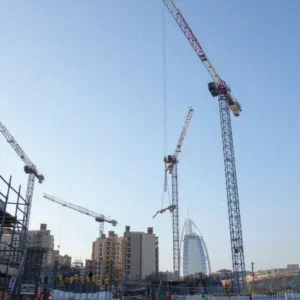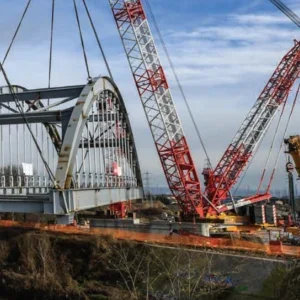Avezaat was founded by Bert’s grandfather in 1939 as a machine shop in Rotterdam. After its building got bombed during the second world war, the company moved to Schiedam, where it is still situated today.
Over the years the family remained involved in the business and in 2009 Bert and his brothers took over the shares from their father. Avezaat is split in three divisions: Avezaat Cranes, specialised in the repair and manufacture of lattice booms, telescopic booms and jibs; Avezaat Steel, focused on steel cutting; ATS, supplying plastic and steel outrigger plates.
At Avezaat Cranes they can work on cranes ranging from 25t to 1,000t from any manufacturer. Bert says that one of the company’s biggest strengths is that it is using high tensile steel for repairs and new building, adding that there are not many companies certified to do that.
Through Avezaat Steel, it has access to a large stock of high tensile steel plates. “Our average stock is 2,500t of steel plates.”
The company has built a strong international reputation and seven out of ten cranes it handles are from outside the Netherlands.
“At the moment the strongest markets are the Middle East, India, Africa and Eastern Europe. Demand from the USA is a bit lower than before due to the euro dollar exchange rate.”
The large number of customers in the Middle East has led the company to open a facility in Dubai, its first outside the Netherlands. Bert says regulatory changes in the UAE have had a positive effect on the repair market.
“In the last ten years, the UAE government has been very keen on improving the quality of equipment used in the country; so there is stricter regulation, more controls and inspections. If an accident with a crane happens, they will check if the inspections were done on time and the condition of the equipment.
If they find that a company did not fulfill its obligations they will take it to court. Ten years ago things were more lenient. Through that change the demand for certified repair became bigger.”
Another important factor behind the opening of the Dubai facility was the long time it took to ship the containers with the parts from and to the UAE.
“The time it takes to send the parts from the UAE to Europe is four weeks, three weeks to ship and one week for custom formalities. After repairing it will take another four weeks for the customer to take delivery. When a crane is not working, it is losing money for its owner every day.”
Answering to whether it is easy to maintain the same quality of service at a facility in a different continent, Bert says it is difficult because of different cultures and circumstances.
He also highlights that recruiting people for workshops is a challenge, as there is a very limited number of people globally with experience working with high tensile steel.
What Avezaat did, was to transfer experienced members of the Dutch team to the Dubai facility and hire local people with experience in the crane industry – people who previously worked for OEMs and big rental companies.
The eight new employees in Dubai were flown to the Netherlands where they undertook training. “We could have done it locally but in order to be sure that it is done according to our system and rules we trained them here. They get a certification in Holland and start doing small jobs at the UAE facility, always monitored and guided by people from our Dutch team working there.”
After a repair, extensive testing follows. “Even if we do the job outside our facilities, it always needs to be checked. It can be done by a non-destructive inspection (NDO), most of the time Magnetic Particle Inspection (MPI) inspection. If for example we renew a part on a telescopic boom, we always have to do the X-ray and ultrasonic testing just to make sure that there is no minor defect inside of the weld.”
In order to certify the repairs Avezaat has to follow local standards, for example AWS for the USA, DIN for Europe. “These are general rules we have to follow and besides that we have specific rules to follow when working on cranes structures. All our welders have to be certified to work with all kind of different materials – inside these materials you have different kinds of thickness that people should be certified to work with.”
“If the plate is 3mm to 8mm thick, we have to follow a different procedure to a plate of 12-15mm.
Every year it has to be checked if an employee has done different jobs inside of this range. If yes, it has to be proven by an inspection report and the person will be awarded another stamp. If not, the employee has to recertify. It is very strict.”
At Avezaat they are optimistic that business activity will be strong in the near future, as the demand for cranes in Europe is increasing. “For the last 6-7 years the problem was demand.
Now there are more cranes working, so there are more damaged cranes to repair and more maintenance to be done.” In terms of company plans, Bert says: “We are planning to build a new 1,200 sqm workshop for expansion in Holland; we are still waiting for approval from the local authorities. There are also plans to start another workshop abroad.”






